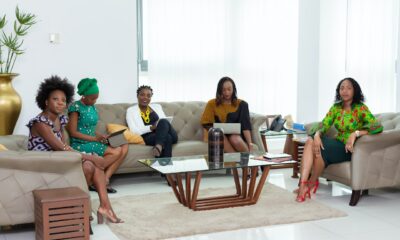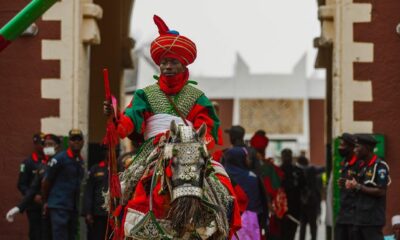Features
Atoke’s Monday Morning Banter: Bilingual Blues
 In an ever changing cosmopolitan world, one has to constantly find that thing – that element which makes you stand out. For some people, it’s where they went to school; for others it’s about their pedigree/lineage; for some it’s about the unique skills they have. For others, it’s about the number of languages you’re able to speak.
In an ever changing cosmopolitan world, one has to constantly find that thing – that element which makes you stand out. For some people, it’s where they went to school; for others it’s about their pedigree/lineage; for some it’s about the unique skills they have. For others, it’s about the number of languages you’re able to speak.
Generally, being able to speak more than one language is a plus- irrespective of whether the second language is a European language, or Nigerian one. I met a Nigerian couple with three children and these kids have never been to Nigeria, but they had a very good understanding of Yoruba. As someone whose default thought process is in Yoruba, I didn’t think anything of the fact that the children understood me. However, the person I was with was thoroughly impressed. She talked about it till we got home. Didn’t I think it was super impressive that those kids were in touch with their parents’ roots? Didn’t I see how cool it sounded that children of 2nd generation Nigerian immigrants could speak their native tongue? Didn’t I think the children would impress their English friends when they grow older?
Giving it a little more thought, I reckoned it actually might be something cool enough to be mentioned – especially as there are several Nigerians who were born and raised in Nigeria who can’t speak their ‘native dialect’. This is a bit awkward because Nigerians who fall in this category are always quick to hold up the shield of ” English is not my native tongue” in defence of bad spelling, syntax and grammar in use of English. {We talked about that here}.
But, there are valid reasons why they can’t speak or write their ‘native language’. One – our official language is English. Meaning we are educated in English {At least that’s what I used to avoid having to do TOEFL or IELTS.} Secondly, Nigeria is one large multi-ethnic and multi-cultural entity; therefore, there is no such thing as ‘Nigerian language’.
Also, because many of our ancestors travelled away from their home state for trade they learned the language of their adopted home. Like my friend, Mo. He has an Ijebu heritage, but he was born and raised in Kaduna. His Yoruba is abysmally poor, but his Hausa is as crisp as they come.
Then, there’s the case of what language your parents speak to you. Another friend has Kalabari parents but she can’t speak the language. When we talked about it, she said they had just never spoken the language to her and so she had no way of learning it. She did mention that she had a problem with people who went off on her as if she had some deficiency. “As long as I’m able to communicate effectively, what should it matter that I am not bilingual?”
 Then, we must not forget the set of people who make a conscious effort to ensure that their children do not learn a Nigerian language.
Then, we must not forget the set of people who make a conscious effort to ensure that their children do not learn a Nigerian language.
Someone once said it’s the responsibility of the parents to pass the legacy down to the children. However, what happens when mother is from Bida and father is from Asaba? Who decides what second language to teach the children? Is the choice to pass a Nigerian language down to your children a function of your parenting skills?
According to my friend, Redd, “Actively and consciously not wanting your kid to learn your lingo is what is bad and smacks of inferiority complex and ‘colomental'”. Now that’s some deep and heavy food for thought.
It also makes you think of the fact that you meet French and Spanish people who can barely speak English and it’s oh so cool and sexy, but when you meet someone who speaks in his native Efik language he’s ‘razz’?
What are your thoughts on the idea of being bilingual? Do you think being bilingual is only cool if you can speak French or Spanish? Have you made an effort to learn another Nigerian/African language? Between Flavour, IllBliss and Phyno I’m slowly on my way to becoming an Igbo specialist.
Do you think some Nigerian languages are slowly dying as a result of lack of use? One impressive thing I’ve noticed about the Welsh people is the STRUGGLE to preserve the language. It doesn’t matter than 7 in 10 young Welsh people can’t speak the language, the government insists on writing everything in English AND Welsh. Somehow or the other {by fire, by force} you will understand ‘Cymru’ and ‘Croeso’.
Do you think that we’re subconsciously being neither here nor there with our languages. You go to a Lagos State government office and everybody there is speaking Yoruba and you’re thinking ‘That’s so unprofessional. They’re uneducated’. But, in South and East Africa, you find that government officials speak their Swahili with pride.
Do you agree that there’s a certain ‘cool’ that comes with silently understanding a language and then people around you are blabbing away oblivious that you understand every word of what they’re saying.
Let’s have fun this morning with some interesting stories. Have a fabulous week ahead and don’t forget tomorrow’s a BIG day at BellaNaija. We can’t wait for y’all to see what we’ve been working on.
Peace, love & cupcakes.
Toodles!
Photo Credit: Dreamstime | Auremar























